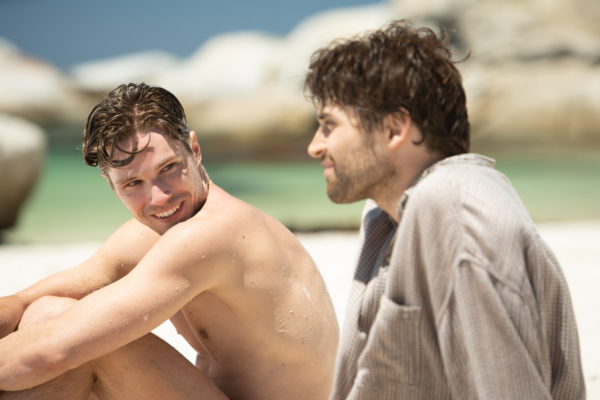
There’s a careful balancing act occurring at the heart of Moffie, Oliver Hermanus’ film about a white, closeted, South African teenager forced into the country’s compulsory military service in 1981.
This is Apartheid, a period of racial segregation that positions the film’s protagonist Nicholas van der Swart (Kai Luke Brümmer) as a cog in the ruling white class’ efforts to “defend” the borders of Angola against non-white citizens and prevent the spread of communism (all of it a thinly veiled excuse for upholding racist attitudes and policies).
The inclusion of Apartheid is little more than a historical backdrop. Although there are a few scenes featuring Black characters (both involving violence), Moffie is principally interested in how this period of hatred and division contributed to violence and hatred of another Othered group: queers. In this capacity, Moffie highlights both the hypocrisy of this initiative, as well as the military’s socially constructed, facile notions of masculinity.
Comparisons abound to Stanley Kubrick’s Full Metal Jacket (for its dehumanizing training sequences) and Claire Denis’ Beau Travail (for acknowledging the homoerotic potential of the all-male military environment). And yet, positioningthat Moffie as a simple mash-up ignores the subtle, calculated examination of the effects of queer repression in this exquisitely gorgeous film.
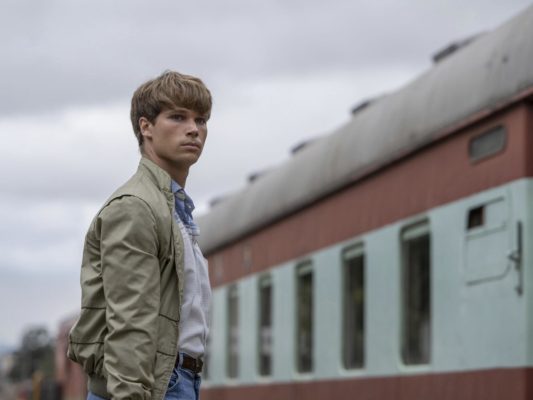
Moffie opens on Nicholas’ sixteenth birthday, which is tinged with melancholy because all parties understand that he ships out the next day. As the evening winds down, Nick’s father Miles (Michael Kirch) passes him a heterosexual porno magazine. It will become clear in time that Nick’s father understands how and why Nick might need such “ammunition” as the teen descends into the toxic, hypermasculine world of the South African military.
The next day on the train, Nick befriends wry fellow recruit Michael Sachs (Matthew Vey). Initially the pair’s homosocial bond suggests that feelings may develop (they spend their downtime together, sing, and Michael even stands up for Nick in a vital moment), but Michael is merely an ally in the sea of chaos filled with other boys’ cries, vomit and cheers.
This range of responses is reflective of how young these recruits are. They are boys: vulnerable, unformed and malleable. Moffie isn’t subtle about the torturous practices employed by the military, embodied by the brutal, unfeeling Lieutenant Brand (Hilton Pelser), to shape the boys into soldiers who will kill (or be killed) on the front lines of a pointless conflict.
This is also not a system that doesn’t care for individuals, which requires Hermanus and co-writer Jack Sidney to strike a balance between the bland uniformity of the all-white cast and Nick’s personal struggle.
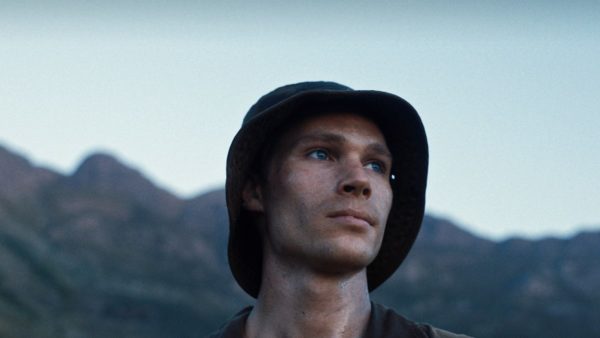
The majority of the film follows Nick’s experience at basic training where the boys are put through their tortuous paces by Lieutenant Brand. Nick’s quiet, withdrawn demeanour and disinterest in engaging with masculine rituals such as trash talking, fighting and boasting about bedding women is confirmation (to the audience at least) of his repressed queer identity.
Over time it is revealed that the walls Nick has erected stem from a humiliating, traumatic experience in his childhood (glimpsed in flashback). The gradual disintegration of his barriers coincides – naturally – as he develops feelings for fellow recruit Stassen (Ryan de Villiers). But even as the pair embark on the first trepaditious stages of a risky relationship, the dangers of being labelled queer in this environment loom large, evidenced in ways both small (Brand’s frequent use of queer slurs) and large (Ward 22, a psychiatric hospital from which patients return significantly altered). The threat of death looms large as the training portion of the film draws to a close, in addition to the threat of being exposed as a Moffie, the Afrikaan word for queer.
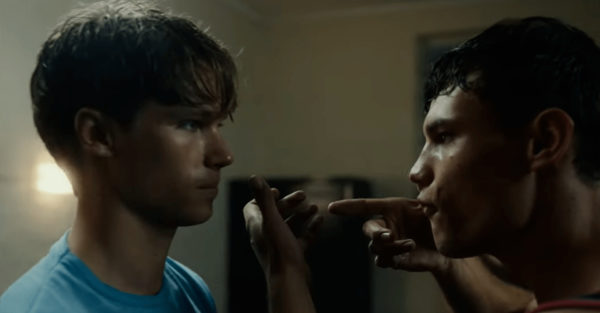
Moffie plays like a biography, which makes sense given that it is based on André Carl van der Merwe’s autobiographical text of the same name. Hermanus deploys his camera like a fly on the wall, fixed primarily on Nicholas in moments loud (during training, in the shared sleeping space) and intimate, such as when he shamefully masturbates in the communal bathroom or stares longingly at Stassen’s glistening torso during a volleyball game.
Although the film risks becoming an endurance test filled with traumatic events, it is always a sumptuous visual feast. Jamie Ramsay’s cinematography captures the dangerous beauty and isolation of the desert as the recruits spend long hours in the sun or hunkered down in self-dug trenches. And even in its hardest moment, such as when Nick is suffering (frequently in silence because he refuses to allow anyone in), Moffie is an emotional tour de force.
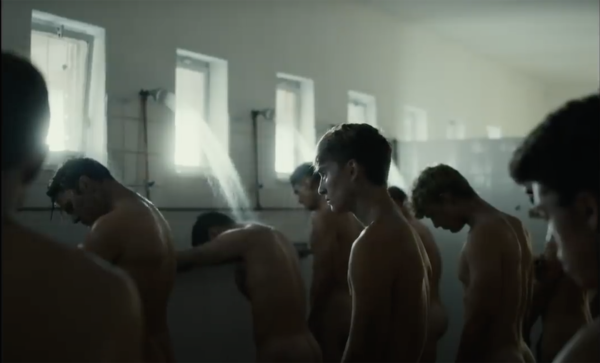
Some will undoubtedly find Moffie’s long dialogue-free passages and denial of cathartic emotional beats off-putting. At times it seems as though the film is holding its audience at arm’s length, particularly in Nick’s refusal to let anyone in. Moffie forces audiences to seek out those brief glimmers of connectivity with Nick, Stassen and the other boys, to bristle at their treatment by an unfeeling, desensitized military, and to ponder the damaging long-term effects on their mental and emotional well-being.
And yet, that’s arguably Moffie’s greatest asset: it is the embodiment of the damaging effects of queer repression. Ultimately its denial of closure, of simplicity, of outcomes that make audiences feel appeased, is reflective of the work that queer people must do in order to live our authentic lives. It is this work, and the beauty uncovered in the fleeting moments along the way, that makes Moffie so quietly compelling and emotionally resonant.
Moffie is available On Demand